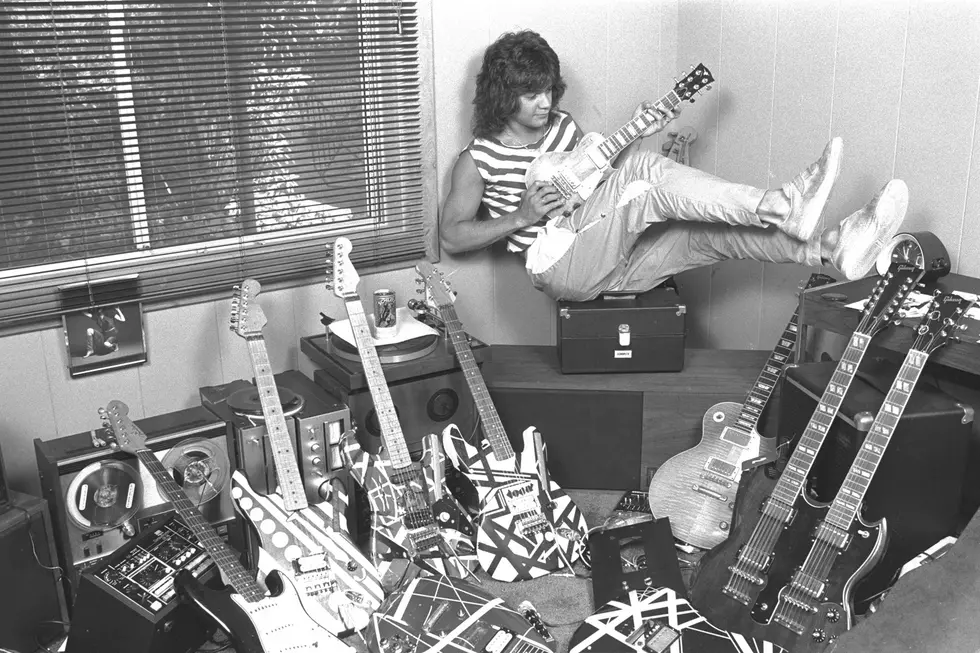
Eddie Van Halen’s Quieter Eruption: 10 Moments of Subtle Genius
Eddie Van Halen and his signature instrumental "Eruption" were Mount Vesuvius, and every other guitarist melted down in Pompeii when Van Halen arrived in 1978. After Jimi Hendrix, Led Zeppelin, Queen and Rush, guitar fans had seen the world reshaped, but Eddie built a new world — a faster, louder, more chaotic and melodic world.
Because Van Halen blew the doors off the year's other rock records, millions of casual fans thought of Eddie as only a shredder. He defined that style, but he carefully chose his notes, tone and approach to serve the song. He was the greatest guitarist of his generation, but he would get out of the way if he needed to.
Looking back at Edward Van Halen's catalog, the guitarist was equally economical and inventive. His unprecedented speed and accuracy only works because he often played so leisurely.
In memory of Van Halen, who died at age 65, we offer 10 moments that showcase the more subtle side of his genius to present the full range of what the man could do.
“Runnin' With the Devil”
Wait, what? How did this rager make a list of quieter moments? While some argue track one on album one is the quintessential Van Halen song, it highlights the guitarist’s discipline. Consider this: “Eruption” is the second song on Van Halen (it’s also the b-side to the 45). A minute after “Runnin' With the Devil” ends, Ed reveals himself to be a fully-formed god, a genius with no peers. He could have filled the kick-off cut with tapping, tremolo dive bombs, feedback storms and speed no one thought possible. Instead, he powers “Runnin' With the Devil” with arguably his most straightforward riff, sits calmly behind David Lee Roth’s vocals for much of the song and takes two solos, each only eight seconds long. Now that’s restraint.
“Women in Love...”
By the time of Van Halen II in 1979, the man had nothing to prove. If the band never made another record after their debut, they would still be icons. But Eddie kept evolving the sounds he pioneered on Van Halen. On the intro to “Women in Love…,” which actually features some pretty standard chords, Eddie changes his tapping approach. Instead of the aggressive attack and heavy distortion he often uses, he taps out and layers harmonics to create something infinitely soothing and sweet. It’s the ideal opening for one of Van Halen’s great mid-tempo, sensitive songs.
"Take Your Whiskey Home”
This Women and Children First cut gets deep into the sleaze and swagger the band did so confidently — seemingly announcing, "Let's toss subtlety overboard and have some fun." But the unadorned acoustic guitar intro reveals skills sometimes hidden in his furious electric work. On an acoustic, you can hear his blues roots, the jazz his dad played (the whole thing positively swings) and his astounding sense of rhythm. These few bars were enough to make fans dream of an entire acoustic blues album.
"Fools"
It's damn near impossible to figure out how Eddie developed his style. The weirdness hinting at Jimi Hendrix and Pete Townshend sneaks in with the first few broad, ringing chords of this Women and Children First tune. But he swerves so sharply away from them after a minute and deconstructs the underpinnings of “Eruption.” The tapping is purposefully messy, the stabs are so thick and ugly that it’s gorgeous.
“Romeo Delight”
The majority of "Romeo Delight" is an exercise in excess. It starts with angry, screaming harmonics and the industrial grinding he invented on “Atomic Punk.” And it doesn’t let up for two minutes, until after the histrionic, barbarous solo — a Top Five pick sweep for sure. But again, Eddie lives to serve the song. He knows that to make the highs seem stratospheric, he needs to create space. For almost a full minute, he cools things off with understated riffing while Dave coos and whispers, “I feel my heartbeat.” Then Ed disappears entirely, so when he returns with a blast of volume, it’s earned.
“Push Comes to Shove”
Off the band’s strangest LP, 1981’s Fair Warning, “Push Comes to Shove” sounds like a lost Parliament-Funkadelic groove, Talking Heads experiment or eccentric Police song (it makes you wonder how much Andy Summers and Eddie influenced each other). Skipping a forceful riff, Ed vamps in the background until he goes completely sideways with a jazz fusion solo; listen to how he fights the melody with dark notes adding just the quickest flash of resolution. Bonus songs: Well, most of Fair Warning, but specifically the dreamy start of “Hear About It Later.”
“Secrets”
Eddie never felt more laid back than he did on Diver Down — maybe because the band had to make it so quickly — but it often works. The guitar line, played on the 12-string half of a Gibson doubleneck, rolls out easy and lazy. Like so many of his little pieces of magic, he doesn’t rush through the trick. Ignore the solo, which is top-notch and apparently done in a single take, and float on the breeze. While “Little Guitars” has more fire, more blitz, it echoes the cool vibe of “Secrets.”
“Summer Nights”
Summer is about simple pleasure. Eddie nailed that on 5150 standout “Summer Nights.” The unaccompanied guitar that introduces the song isn’t exactly slight; its bright and ragged tone came from a Steinberger GLST, the briefly-fashionable instruments without a headstock but with a vibrato system that allowed them to change pitch with the flip of a switch. That gave Eddie’s guitar part a depth without the need for extra flash. The less-is-more, slow-is-OK approach can be heard again on the uncomplicated groove of “Best of Both Worlds” and the positively languid opening of “Black and Blue.”
“Finish What Ya Started”
Few songs divide Van Halen fans like this one. Eddie’s detour into chicken pickin’ on OU812 didn’t sit well with many purists. But this may be the most uncharacteristic song he ever recorded, and for that it deserves attention. The tone is exceptionally clean — like Nashville-country clean — giving Ed’s playing nowhere to hide. But he takes on the challenge with economic restraint. The solo could be something you’d hear from Mark Knopfler on his very best day: pristine but not soulless, showy but not flamboyant, fast and tight but delightfully in the pocket.
“Right Now”
Forget about the message. Forget about the video, the chorus, Crystal Pepsi, the MTV Video Music Awards and what all of that represented to the faithful. Focus on the piano. By the time For Unlawful Carnal Knowledge arrived in 1991, Eddie had been using keyboards for a decade. But “Right Now” had him playing nakedly. Without the effects he piled on top of his guitar, the raw piano shows what he does so well: melodies that sit somewhere between sophisticated, classical-like ideas and exceedingly catchy pop. Also, he’s one hell of a piano player.
Eddie Van Halen Year by Year: 1977-2017 Photos
More From 98.7 Jack FM










